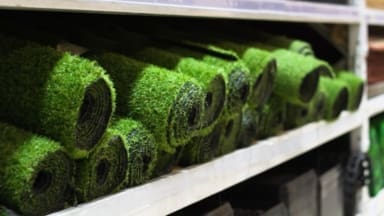
In the latest, Winkworth Property Exchange Podcast which focussed on gardens and their value to a property; Dominic Agace, Chief Executive of Winkworth, Charles Erwin of Winkworth Notting Hill and garden designer Joanna Archer provided some insight into property gardening trends, one of which related to the use of artificial grass.
The environmental damage of the use of artificial grass is substantial. The 2023 Say No to Plastic Grass & Plants campaign by the Society of Garden Designers, revealed that plastic grass not only removes vital habitat and is devoid of any value for wildlife, but also causes plastic pollution, leakage of micro-plastics into waterways, flooding, contribute to urban heat islands due and contribute to greenhouse gas emissions in their production.
Awareness of the negative environmental impact is increasing, but perhaps even more so with potential financial repercussions as it seems to be a deterrent for potential property buyers. Not only does it go against the current trend for people wanting to connect with nature – a vital lesson learned from the pandemic, but the use of plastic grass may even lead to property damage.
Speaking to the podcast host Anne Ashworth, Charles Erwin explained that artificial grass is “on its way out” as more people become aware of its environmental impact but also visually, fake grass no longer appeals. “The day of the mindless garden, with just a roll of easigrass has gone. People are looking for much more from their gardens. Practically as well, it’s a nightmare to keep clean. Once people realise you have to hoover it they don’t want it anymore. On roof terraces, we have found that it could be a nightmare as it acts like a sponge and sucks up water, which then leaks into your house. So you have to be very careful about where you put it” said Erwin.
The London based, garden designer Joanna Archer added that as a design studio they were seeing big shift away from “minimalist, sterile gardens, with wall to wall paving, artificial grass and little rows of lollipop trees”. Instead, people are embracing wildlife rich gardens, “filled with plants and birds and buzzing bees, that make you feel so much better sitting in it.”
The experts from Winkworth confirmed that gardens add to the crucial, wow-factor and first impressions of a house and therefore form a key part of the “home-staging” process when selling a property. The experts on the podcast agreed that investing in garden improvement, as one would do a bathroom or kitchen, would result in property value uplift. “I definitely believe so. Before you sell your house, you want to make it look as good as possible for the wow-factor. It is well known that people make the decision fairy quickly on first impressions when they walk into a house. What you put in, you generally get back. To neglect a garden in that approach would therefore be foolish”, explained Dominic Agace, the Chief Executive of Winkworth.
A few other interesting points made during the podcast;
- Even though south-facing plot still attain a premium, the ever hotter summers may deter buyers in future so as not have a “kitchen baking in the afternoon sun”.
- The Winkworth experts revealed a worrying trend relating to increased demand for air-conditioning in London as insulated properties become unbearably hot in summer.
- Space providing separation from the house is still in demand to allow for working from home. Gardens that allow for that division of space that allows for the shed/office may attain a premium.
- Amongst the London, young professionals the desire for a roof terrace as an additional ‘room’ and/or to entertain is on the rise. According to the experts, the terraces are often kitted out with garden kitchens and designer furniture.
- As people seek to connect with nature, gardens with more trees and plants, less and more permeable paving seem to be the current preference.
- A house on one of London’s 600 garden squares continue to attain a premium price, some averaging around £20 million. Hence “a pretty safe asset” and forever the “jewel in the crown of London property.”

